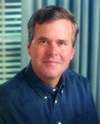Yes, we here at the Infospigot headquarters and residence in Berkeley, California, indulge ourselves in all sorts of low-brow entertainments. For instance: Over the past couple of years, Thursday night has meant “Survivor” and “CSI,” viewed as we eat burritos in front of our flickering Sony. (Actually, this is kind of a high-brow evening, given that for a brief time our Thursday night habit was WWF’s “Smackdown.” That turned out to be time well spent, though, because we got to see The Rock in the day of “the People’s Elbow — the most electrifying move in sports entertainment.” But I digress.)
Now, we never cottoned to the Miami version of “CSI,” and quit watching after six episodes or so. Even though the same creative team is behind both shows, the Miami production just doesn’t feel like it’s up to the same level as the original, set in Las Vegas. The Miami lead actor, David Caruso, is one obvious difference. Sure, his Las Vegas counterpart, William Petersen, can be arch, but I can actually buy him as an inquisitive, creative investigator, and one who has some interesting character quirks. His acting has some range. Caruso’s work, by contrast, has all the subtlety and nuance of someone banging iron bars together outside your window. It’s relentless. Not particularly pleasant to watch or hear. One wonders how he’s gotten so far with this act.
The differences between the shows go further than that. Both shows share a sort of MTV/music video visual style, especially when they go into their crime-scene/crime-lab montages with the investigators and technicians doing their thing. But the style, which has a slick but natural feel in the Las Vegas show, feels pasted-on and artificial in the Miami version. I think that’s because the ensemble cast, one of the original show’s strong points, is weaker in Miami, or at least hasn’t developed the chemistry the Las Vegas show thrives on: The folks surrounding Caruso look like they’ve been hired because they’re beautiful people, period.
Now comes the third entry in the “CSI” franchise, a show set in New York City. The creators have come up with something much different in tone and maybe in substance from the Las Vegas and Miami series. Whereas the earlier shows use a lot of flash and attitude and humor and try to capitalize on the exotic nature of their locations, the New York show was dark and somber; in fact, the “CSI” characters seemed subdued and preoccupied to the point of depression. A key conversation involved the lead investigator, played by Gary Sinise, and a paralyzed, gravely injured victim who could communicate only by blinking. The exotic locations included brief forays into a garbage scow and a wasteland on the Brooklyn side of the Manhattan Bridge.The preview of next week’s show seemed to promise the same, tone-wise; and the little we found out about the characters suggests they’re in a justifiable funk and that it’s going to be some time before they emerge from it.
As far as the episode itself: The producers tried to jam too much into it. Partly that’s the burden imposed by having to introduce characters, suggest some history, and get them rolling on a complex case. That burden will get lighter as the series develops. It’ll be interesting to see whether the tone of the show gets lighter, too.
Like this:
Like Loading...



